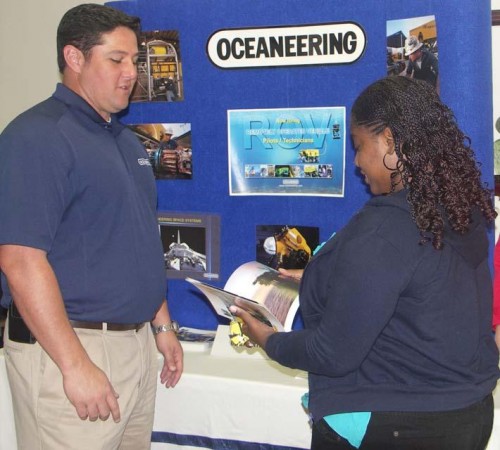Tuesday, April 12
April 12, 2011Ernest Eschette Jr.
April 14, 2011Warren Lirette has been working at getting back to work during the past year. Since 1992 he labored offshore as a rigger and deck foreman and enjoyed the physically grueling job.
On April 20, 2010, the vessel on which Lirette was a crewmember was on standby with a remotely operated vehicle in case it was needed during the BP Deepwater Horizon explosion and oil spill.
When the initial danger was reduced, so were jobs, including those of Lirette and others who had less seniority than some of their co-workers. That is also when the industrial disaster became personal for many tradesmen across the region.
“I was working before the oil spill,” Lirette said, as he walked from booth to booth with a resume and application filled folder, during a job fair for skilled laborers at Fletcher Technical Community College. “I had just started with [the company] I worked for six months before that.”
During the past 12 months, Lirette and others like him saw skilled jobs dry up, especially when an offshore drilling moratorium was put in place. Since losing his job, he has been collecting and selling scrap metal to support his wife, who is also looking for work, stepson and two grandchildren.
The limited awarding of drilling permits in combination with Middle Eastern turmoil, has sparked activity along the Gulf coast. Experts contend that as a result jobs may soon be coming back for those with skilled trades.
“I think things are starting to get better,” said Tony Alford, president of the South Central Industrial Association. “We need to keep our eye on the ball and keep pushing Washington to keep releasing these permits.”
Fletcher Chancellor Travis Lavigne confirmed claims that link the starting point for a drop in industrial jobs to the BP disaster, but added his observation that companies from shipbuilders, to drillers, to offshore service may be ready to restore their workforces and get back to work.
“[It] is picking up a little bit,” Lavigne said. “In the technological areas, especially when it comes to marine transportation, there has been a slowdown … but that is picking up a little bit.”
According to the Louisiana Workforce Commission, statewide employment projections, which were compiled after the oil spill, contend that by the year 2018 there should be a growth level of 7 percent among skilled labor in the oil and gas industry alone.
Sealand Mechanical commercial construction manager Matthew Karns said his company is among those hiring offshore workers. “Especially with the oilfield,” he said. “A lot of things are going on. Hopefully we will be getting more deepwater work, and with that there is a lot of commercial construction across the south. We are seeing a need for people with HVACR industries and also sheet metal work.”
“I’m looking for welders, fitters, blaster painters and electricians,” said Konnie Billgren, sales manager with Original USA Labor. “The industry is coming back to life. Ships are starting to be built again and that is a good sign.”
“What we always want to do is help provide an opportunity for individuals to come by and see what is available,” Lavigne said of job fair participants who represented numbers in addition to the Fletcher student body.
“I hate to pay high prices for gas,” Alford said, “but that means a lot of jobs for our area.”
Darian Breaux (left) of Oceaneering talks with Michelle Jones about offshore safety career opportunities during the Fletcher Technical Community College job fair. MIKE NIXON








